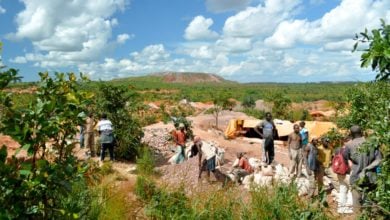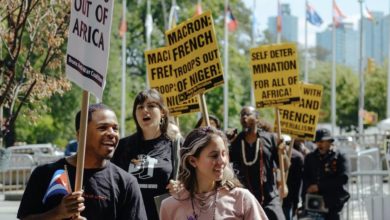On Sat. May 9, Jacob Zuma was sworn in as South Africa’s fourth president since Apartheid ended in 1994. Zuma was the candidate of the African National Congress, which swept to a landslide victory in the April 22 elections.
 Residents of Soweto line up to vote in the April 2009 elections. |
The ANC won more than 66 percent of the vote. The sitting opposition party, the Democratic Alliance, came in second with 15 percent of the vote, while the ANC split, Congress of the People (COPE) received a distant third with 7 percent. The Inkatha Freedom Party came in fourth with 4 percent while the remaining parties all received less than one percent.
What does this mean for the political situation in South Africa?
The Opposition
Leading up to the April 22 elections, the corporate media coverage oscillated between focusing on controversies in Zuma’s personal life and political career and contemplating the strength of the opposition against the ANC.
The biggest story on the opposition front is COPE, which recently split from the ANC after former president Thabo Mbeki was forced from the leadership. It is led by prominent ex-ANC personalities.
Prior to the elections, many pundits voiced expectations that COPE would win away enough of the ANC vote to prevent the ANC from gaining a two-thirds majority. COPE was also expected to replace the DA as the official opposition. However, COPE turned in a poor showing, taking few votes from the ANC. Instead, it seems to have done more damage to the smaller opposition parties. COPE did make some gains in provincial government representation.
COPE lacks a real social base, and has been primarily defined by its opposition to the ANC. COPE was unable to sway large sections of the working class and peasants, who identify the ANC as the leader of the liberation movement, away from the ANC.
Also, COPE did not gain the confidence of either the South African capitalists or the imperialist powers. Their fealty to Mbeki style neo-liberal governments may be inline with the political objectives of these groups. But COPE had no reason, beyond the purely partisan, to abandon the ANC and has not sufficiently differentiated itself in this regard either.
During his campaign, newly elected President Zuma consistently reassured international capital that his term would be no threat, even though he made some promises to improve the conditions for the masses of people in South Africa. Some reports indicate that the United States views Zuma as potentially more pliable than former president Thabo Mbeki.
The opposition is also clearly fragmented. The Democratic Alliance is based primarily on small capitalist and capitalist liberal whites, as well as some Blacks and Indians of similar background. The possibility of some broader unity between the DA and COPE is possible. Any significant turn leftward by the Zuma government would probably lead to more ANC defections to both. Unity amongst opposition forces with more serious support from the ANC’s ruling class backers would threaten ANC rule.
ANC and the Left
The ANC, as predicted, won a landslide victory. The ANC is based on the cross-class coalition that defined it during the liberation movement. The ANC pulls together elements of the South African capitalist class and the working class, represented primarily by the trade union COSATU and the South African Communist Party. This base is built from the ranks of the poor and working class. The sectors supported the ANC in this election, despite some grievances.
Many thought that with a strong challenge from COPE, the ANC would be forced to move closer to its base. This would mean a sharp move to the left, with the SACP and COSATU playing a leading role.
That, however, now seems less likely. As COPE’s opposition has proved to be somewhat ephemeral, Zuma will be feeling less pressure to move to the left and more to tack to the center-right to keep the capitalist elements in the cross–class coalition .
The SACP and COSATU, however, do have a strong social weight in the ANC. If they press for more progressive, and even socialist-oriented policies, they may have success. During the last Parliament, communist members declared they would not be strictly bound to the ANC whip and would oppose anti-working class measures. If they stick to this, sharp conflict over policies could erupt in the ANC.
South Africa’s economy, the largest in Africa, is mired in deep economic crisis. Official unemployment has reached 23.5 percent, and 48 percent of South Africans live in absolute poverty. Although apartheid ended 15 years ago, there are still drastic inequities in the living conditions of Black and white South Africans. Four million whites still control 90 percent of the economy. It is the majority Black population that suffers the most from any crisis.
The economic crisis coupled with the strength of the progressive forces within the ANC may push the new government toward a general leftward move.
However, those with ideas that South Africa can be Africa’s “Venezuela” should be cautious. Any significant moves to the left risk alienating backers in the South African ruling class and Washington. The moves would threaten ANC rule by strengthening its strongest opponents.
While it’s impossible to know exactly which way the government will go, it’s clear the demands for an end to the grinding poverty of the masses will assert itself more with the economic crisis.





